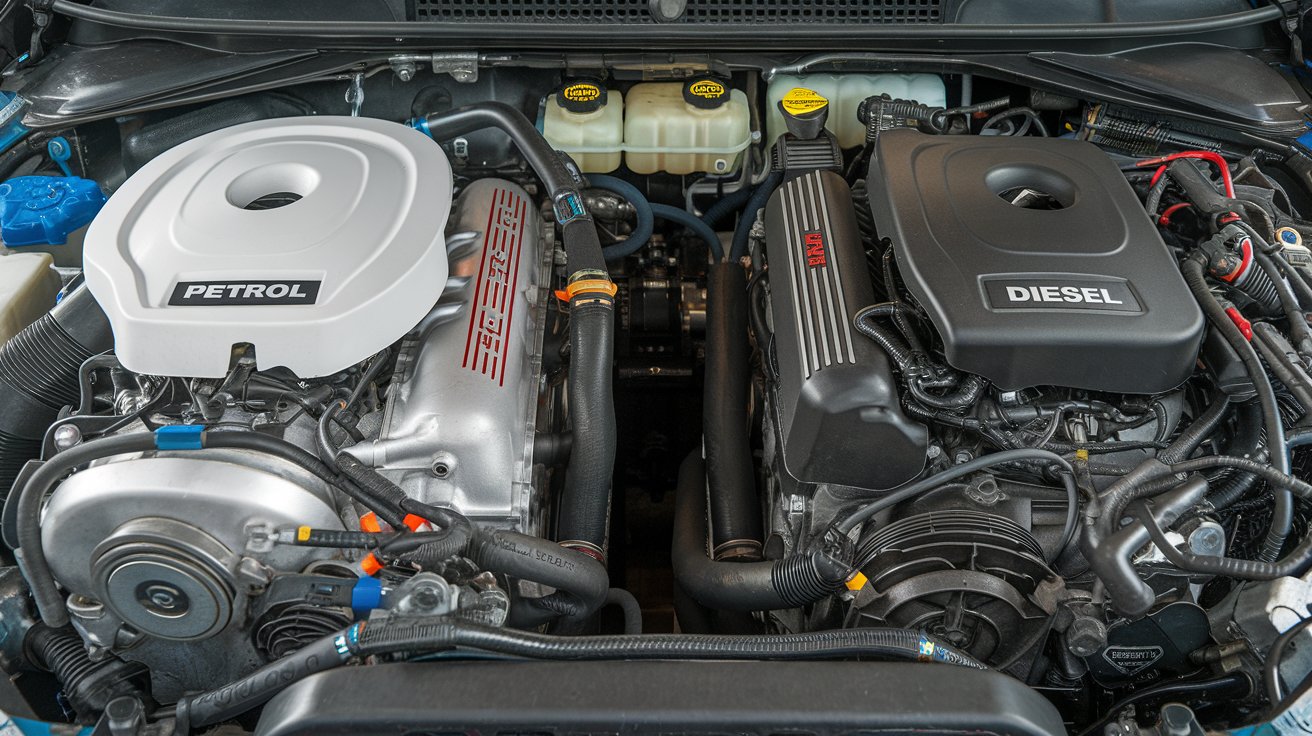Introduction
Petrol and diesel engines are the two most common types of internal combustion engines (ICEs) used in automobiles. While both operate on the same basic principle—burning fuel to produce energy—they have significant differences in combustion process, fuel efficiency, maintenance, and performance.
Choosing between a petrol or diesel engine depends on various factors such as cost, efficiency, driving needs, and environmental impact. In this article, we will explore the key differences between petrol and diesel engines to help you understand which one suits your needs better.
1. Combustion Process
The primary difference between petrol and diesel engines is how they burn fuel.
Petrol Engine (Spark Ignition Engine)
- Uses a spark plug to ignite the air-fuel mixture inside the cylinder.
- Runs on a lower compression ratio (8:1 to 12:1), making the combustion process smoother.
- The fuel-air mixture is pre-mixed before entering the combustion chamber.
Diesel Engine (Compression Ignition Engine)
- No spark plug—fuel ignites due to high pressure and temperature inside the cylinder.
- Operates at a higher compression ratio (14:1 to 23:1), leading to more energy extraction from fuel.
- Air is compressed first, and fuel is injected separately, allowing efficient combustion.
Verdict: Diesel engines rely on high compression for ignition, making them more efficient, while petrol engines require spark plugs for controlled combustion.
2. Fuel Efficiency and Cost
Petrol Engine:
- Petrol is generally cheaper per liter than diesel.
- Lower fuel efficiency—consumes more fuel per kilometer compared to diesel.
- Higher engine speed (RPM) but lower torque.
Diesel Engine:
- Diesel fuel has higher energy density, meaning better fuel efficiency.
- Diesel cars deliver 20-30% more mileage than petrol cars.
- Diesel engines are ideal for long-distance travel and heavy-duty vehicles.
Verdict: Diesel engines are more fuel-efficient, making them cost-effective for high-mileage users. However, petrol cars are cheaper to refuel in regions where diesel is not subsidized.
3. Performance and Power
Petrol Engine:
- Produces more power per liter and higher RPM (Revolutions Per Minute).
- Quieter and smoother than diesel engines.
- Best for city driving and short trips due to quick acceleration.
Diesel Engine:
- Higher torque at lower RPM, making it better for towing and heavy loads.
- Provides steady power output, ideal for highways and commercial use.
- Noisy and heavier than petrol engines.
Verdict: Petrol engines offer better speed and smoothness, while diesel engines provide more torque and power for heavy-duty applications.
4. Maintenance and Longevity
Petrol Engine:
- Requires more frequent maintenance (spark plugs, fuel injectors, etc.).
- Shorter lifespan compared to diesel engines.
- Easier to repair and less expensive.
Diesel Engine:
- Built for durability—longer engine life due to stronger internal components.
- Higher maintenance costs—expensive parts like fuel injectors and turbochargers.
- Requires regular servicing to prevent clogging of fuel injectors.
Verdict: Diesel engines last longer but are costlier to maintain, while petrol engines require frequent maintenance but have lower repair costs.
5. Environmental Impact
- Petrol engines emit more carbon dioxide (CO₂) but produce fewer nitrogen oxides (NOx) and particulates.
- Diesel engines emit less CO₂ but produce higher NOx emissions and soot, contributing to air pollution.
With stricter emission regulations, many manufacturers are developing cleaner diesel engines and hybrid petrol engines to reduce environmental damage.
Verdict: Petrol engines have lower toxic emissions, but diesel engines produce less CO₂.
Conclusion: Which Engine is Better?
The best choice depends on your driving habits and needs:
- Choose a Petrol Engine if:
- You drive mostly in cities with stop-and-go traffic.
- You prefer a quieter, smoother ride.
- You don’t want to spend extra on maintenance.
- Choose a Diesel Engine if:
- You drive long distances frequently.
- You need higher torque for towing or heavy loads.
- You want better fuel economy and engine durability.
With the rise of electric vehicles (EVs) and hybrid cars, both petrol and diesel engines are evolving. While diesel remains popular for commercial use, petrol engines are preferred for personal vehicles due to their smooth performance and lower emissions.
